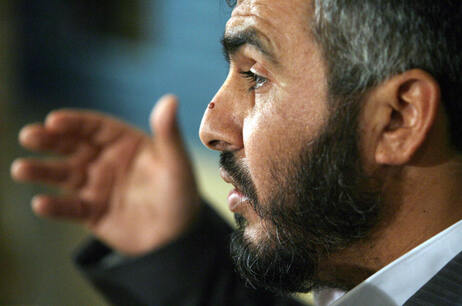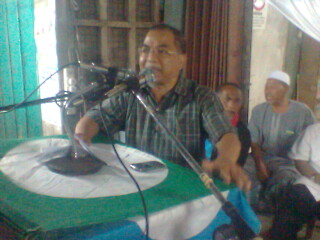From NPR.COM
Hamas Foreign Minister We Accept Two-State Solution With ’67 Borders The Two-Way NPR

Hamas’ Deputy Foreign Minister Ghazi Hamad.
Hamas’ Deputy Foreign Minister Ghazi Hamad told NPR’s Robert Siegel that the Islamic political party has accepted a two-state solution that respects the 1967 borders.
Robert asked Hamad in a very straight forward way: “If Israel were to accept a two-state solution in which Palestine would be in Gaza and the West Bank and have its capital in Jerusalem, is that an acceptable aim that Hamas is striving for or is that in and of itself insufficient because there would still be a state of Israel?”
“Look, we said, frankly, we accept the state and ’67 borders. This was mentioned many times and we repeated many times,” said Hamad. Here’s his full answer:
Ghazi Hamad on All Things Considered
Hamas, which has been known for its rocket attacks and suicide bombings, just signed a reconciliation with its secular rival Fatah. In 2007, Hamas expelled Fatah from Gaza and the Palestinians ended up with a divided government. According to analysts, the reconciliation between the two groups means Hamas is trying to moderate its views to appeal to the West.
Hamad told Robert that people should not judge Hamas on what it used to be before:
Ghazi Amad on All Things Considered
“I think Hamas shows a lot of flexibility. We became more pragmatic, more realistic. Hamas is ready to go more and more for political solutions. Hamas could be a good player in making peace in this region, but don’t use sticks against him, and punishment against Hamas,” Hamad said, referring to the sanctions imposed after Hamas won a decisive majority in the Palestinian Parliament in 2006.
In an analysis piece by the Associated Press, they point out that Hamas’ more moderate stance may be genuine:
Both Hamas officials and outside analysts say the group has learned some bitter lessons during its four years in power in Gaza. The impression is that Israel’s blockade, which caused widespread hardship in the crowded territory, a blistering Israeli military offensive two years ago and the uprisings throughout the Arab world have all factored into its thinking.
Hani Masri, a Palestinian commentator who sometimes mediates between Hamas and its secular rival, Fatah, said Hamas realized that to lead the Palestinians, it needs “acceptance by the international community, particularly the West.”
In his interview with Robert, Hamad did criticize Israel. He said the ball is now in its court and it needs to decide whether it’s willing to accept a Palestinian state with its capital in Jerusalem and whether it’s willing to “evict” its settlers in Palestinian territory.
“We are just fighting against occupation,” Hamad said. “We are figting to liberate our homeland. This our ambition.”
Hamad also said Hamas was “not in the pocket” of Iran or Syria. Hamad made much the same comments on the BBC’s Hardtalk. But PressTV, the Iranian government’s English-language news service, reports that Hamad told them Hamas would “never recognize Israel.”
For it’s part, Israeli Prime Minister Benjamin Netanyahu has made it clear that Israel wants nothing to do with a Palestinian government that includes Hamas.
“A leopard has sunk its teeth in our flesh, in the flesh of our children, wives, our elderly, and we will not be tempted to believe that this leopard has now changed its spots,” Netanyahu told the AP. “We will not ignore its voracious growls. We will strike it down.”
Note we’ve added the interview as it aired on All Things Considered at the top of this post.
=====
From New York Times
One day after celebrating a landmark reconciliation accordfor Palestinian unity, Khaled Meshal, the Hamas leader, said on Thursday that he was fully committed to working for a two-state solution but declined to swear off violence or agree that a Palestinian state would produce an end to the Israeli-Palestinian conflict.
Related
Palestinian Factions Sign Accord to End Rift (May 5, 2011)
"The whole world knows what Hamas thinks and what our principles are," Mr. Meshal said in an interview in his Cairo hotel suite. "But we are talking now about a common national agenda. The world should deal with what we are working toward now, the national political program."
He defined that as "a Palestinian state in the 1967 lines with Jerusalem as its capital, without any settlements or settlers, not an inch of land swaps and respecting the right of return" of Palestinian refugees to Israel itself.
Asked if a deal honoring those principles would produce an end to the Israeli-Palestinian conflict, Mr. Meshal said, "I don't want to talk about that."
He added: "When Israel made agreements with Egypt and Jordan, no one conditioned it on how Israel should think. The Arabs and the West didn't ask Israel what it was thinking deep inside. All Palestinians know that 60 years ago they were living on historic Palestine from the river to the sea. It is no secret."
Asked whether in his pact with Mahmoud Abbas, the president of the Fatah-dominatedPalestinian Authority, he agreed to end violent resistance, he replied: "Where there is occupation and settlement, there is a right to resistance. Israel is the aggressor. But resistance is a means, not an end."
He added that over the coming months, as Hamas and Fatah work out their differences, "we are ready to reach an agreement on how to manage resistance." He noted that Hamas had entered into cease-fires with Israel in the past and that it was ready to do so in the future. There is one in effect right now. But his broad principle, he said, was this: "If occupation ends, resistance ends. If Israel stops firing, we stop firing."
Asked if he thought nonviolent resistance was a useful approach for the Palestinians, he replied, "Unfortunately, nonviolence doesn't work against the Israelis."
Israel has blasted the Fatah-Hamas agreement as, in effect, bringing terrorists into the Palestinian government. The United States has said it is waiting to see what the pact consists of before reacting. Washington provides hundreds of millions of dollars a year to the Palestinian Authority.
"We are going to be carefully assessing what this action really means," Secretary of StateHillary Rodham Clinton said of the pact in Rome. She said that Washington could not accept a Palestinian government including Hamas unless it renounced violence, agreed to live by previous Israeli-Palestinian agreements and recognized Israel. These are the so-called "quartet principles," agreed on by the United States, United Nations, European Union and Russia.
Prime Minister David Cameron of Britain made a similar point during a visit to London by Prime Minister Benjamin Netanyahu of Israel. Any new Palestinian government "must reject violence, recognize Israel's right to exist and engage in the peace process," a spokesman for Mr. Cameron quoted him as saying.
Mr. Abbas, who has largely given up on peace negotiations with Israel under Mr. Netanyahu, concluded that the best way forward was national unity and an appeal to the international community to create a Palestinian state in the West Bank, Gaza and East Jerusalem.
His Fatah-dominated Palestinian Authority holds sway in the West Bank, but Hamas runs Gaza. The two groups fought a brief civil war in 2007 and have been divided ever since. The agreement they signed this week calls for a new government of technocrats to plan for elections in the coming year as well as committees to coordinate security cooperation and questions like prisoner releases.
But the bitterness runs deep and many challenges remain. Mr. Meshal noted in the 30-minute interview that at the unity ceremony in Cairo on Wednesday, there had been a delay because Mr. Abbas had not initially agreed that Mr. Meshal could speak from the podium.
"I don't want to go into the details of it, but there was an unfortunate wrong and we overcame it," he said of the ceremony arrangements. "This is not the superficial issue of who is sitting on the stage. The crucial issue is that there has been a division between the two main parties in the Palestinian arena. Reconciliation should be seen in the arrangement and in who is speaking."
Asked what had changed in recent months that allowed the long-delayed pact to go through, he said that both Fatah and the new Egyptian government had agreed, for the first time, to Hamas's adding annexes to the agreement reflecting its views. He declined to elaborate on the contents of those additional items.
Mr. Meshal said that there was recent activity on ways to release Gilad Shalit, the Israeli soldier held for nearly five years by Hamas, but that there had been no breakthrough. He blamed Mr. Netanyahu, saying he was responsible for the delay.
This posting includes an audio/video/photo media file: Download Now







Tiada ulasan:
Catat Ulasan